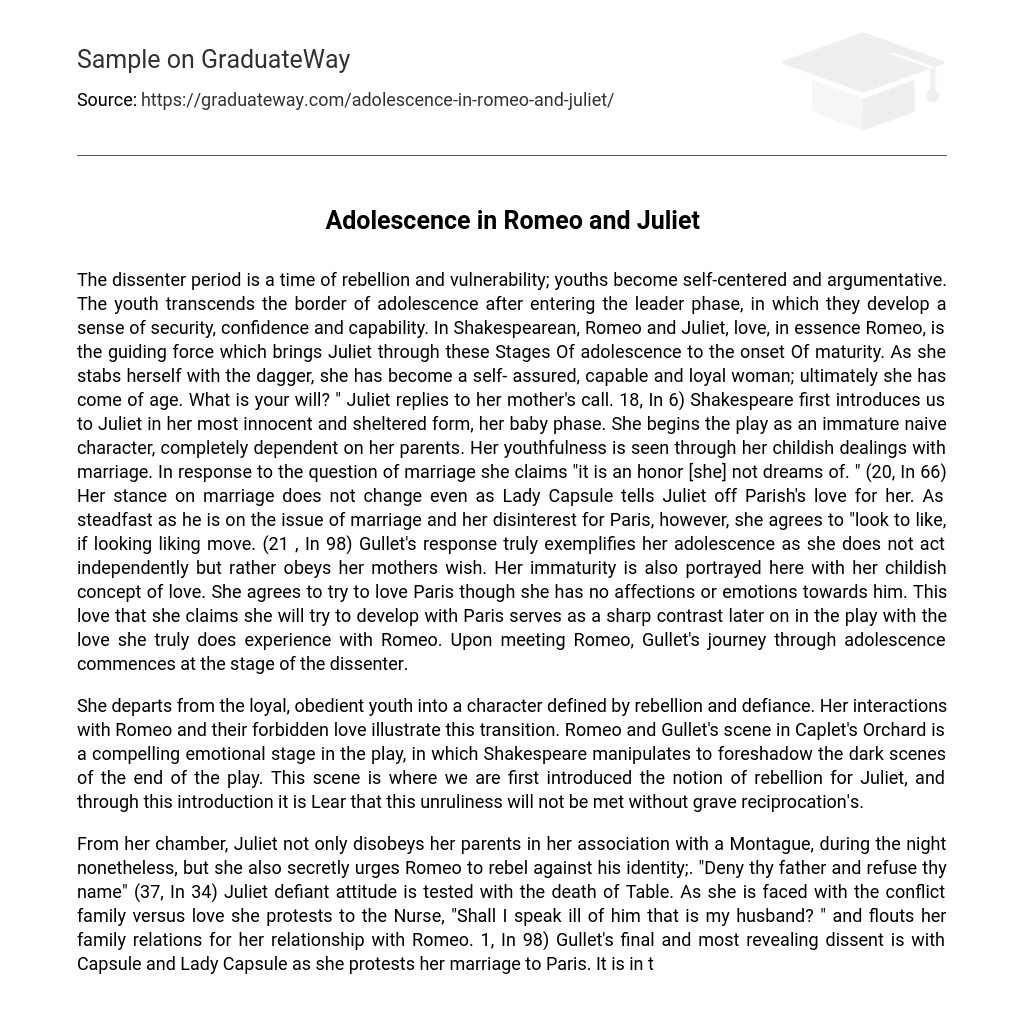During the dissenter period, youths often become self-centered and argumentative, rebelling against authority and feeling vulnerable. However, as they enter the leader phase, they begin to develop a sense of security, confidence, and capability. In Shakespeare’s Romeo and Juliet, love, embodied by Romeo, acts as the guiding force that leads Juliet through the stages of adolescence towards maturity. By stabbing herself with a dagger, Juliet demonstrates that she has become a self-assured, capable, and loyal woman, ultimately coming of age.
When Juliet’s mother calls for her, Juliet replies with the question “What is your will?” This initial introduction of Juliet in her innocent and sheltered form shows her in her baby phase. At the beginning of the play, she is immature and naive, completely dependent on her parents. Her youthfulness is evident in her childish perspective on marriage. Even when Lady Capulet speaks of Paris’s love for her, Juliet remains firm in her disinterest for marriage, stating that it is an honor she does not dream of.
Despite this stance, when Juliet’s mother expresses a wish for her to “look to like” Paris, Juliet agrees to try to love him without actually feeling any affection or emotion towards him. This response showcases her adolescence and immaturity as she does not act independently but rather obeys her mother’s wishes. It also highlights her childish concept of love.The love that Juliet says she will try to develop with Paris is sharply different from the love she actually experiences with Romeo. When she meets Romeo, Juliet’s journey through adolescence begins as a dissenter.
She undergoes a departure from being a loyal and obedient youth to becoming a character known for her rebellion and defiance. The way she interacts with Romeo and their forbidden love demonstrates this transformation. The scene in Caplet’s Orchard where Romeo and Juliet meet is an intense and emotionally charged moment in the play, which Shakespeare cleverly uses to foreshadow the dark events that happen later on. It is in this scene that the concept of rebellion for Juliet is first introduced, and from this moment we understand that her defiance will not be taken lightly.
From her chamber, Juliet not only disobeys her parents in her association with a Montague, during the night nonetheless, but she also secretly urges Romeo to rebel against his identity;. “Deny thy father and refuse thy name” (37, In 34) Juliet’s defiant attitude is tested with the death of Table. As she is faced with the conflict family versus love she protests to the Nurse, “Shall I speak ill of him that is my husband? ” and flouts her family relations for her relationship with Romeo. 1, In 98) Juliet’s final and most revealing dissent is with Capsule and Lady Capsule as she protests her marriage to Paris. It is in this scene that Juliet dismisses all notions of obedience and openly rebels out of her absence of love for Paris, and her intense forbidden love for Romeo. As she swears that she “will not marry yet” and that when she does it “shall be Romeo” she not only challenges her parents orders but reveals her sense of independence and self-confidence that this stage of rebellion has spurred.
Juliet comes to the realization that she may never have the opportunity to see Romeo face-to-face again. As a result, their relationship becomes solely emotional rather than physical. She contemplates if they will ever reunite, signifying the onset of adulthood’s final phase, the leader stage. This parting from Romeo serves as a catalyst for Juliet’s ultimate development and maturity. The departure and exile of Romeo create an emptiness in Juliet’s existence, compelling her to release the love that has facilitated her evolution from an innocent girl into a grown woman.
In the beginning, Juliet is determined to free herself from her ordeal by ending her life. However, at the end of the play, Juliet’s decision to commit suicide is not out of desperation or fear. Instead, it is driven by her passionate and courageous love for Romeo. Her newfound self-assurance and understanding prevent her from acting impulsively and instead lead her to seek help from Friar Lawrence. The frantic speech she gives before taking the potion given by Friar Lawrence represents her maturity.
In the midst of madness, Juliet’s strong determination and loyalty to Romeo bring her back to sanity as she struggles with the idea of “playing with [her] ancestors’ bones” but ultimately drinks the potion. Friar Lawrence reflects on the intensity and extremity of the situations in this play: the deep love between Romeo and Juliet, and the intense hatred between the Capulets and Montagues. Juliet’s unwavering innocence is one extreme in this play. While innocence is usually seen as pure and virtuous, in Juliet’s case it became “repulsive in its own delightful nature” and led to her tragic demise.





